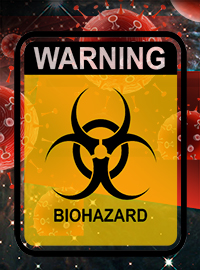| U.S. at Heightened Risk for a Germ Attack But Also More Ready |
 |
|
By Betsy McCaughey
Wednesday, May 27 2020 |
America hasn't seen the last of killer coronaviruses. China's "bat woman," a Wuhan Institute of Virology investigator who handles bat viruses, is warning that the current pandemic is "just the tip of the iceberg." Friendly advice from a researcher? Perhaps, but America's enemies are watching. They've seen the devastating impact of the coronavirus here, and "just how disruptive" a bioterrorism attack could be, warns Thomas G. Mahnken, a defense expert at Johns Hopkins. Who needs intercontinental missiles when a highly contagious, untreatable virus can paralyze the most powerful nation in the world? America is a likely target for "biological agents designed to cause mischief on a massive scale," cautions George Mason University security expert Ellen Laipson. The untold story is that the United States is significantly more prepared than a mere three months ago. In that short time, even while marshaling resources to equip hospitals and treat patients, the Trump administration has set in motion significant improvements in biodefense readiness, undoing two decades of neglect. The same improvements will enable the U.S. to defend against a second wave of the coronavirus, or another naturally invading global virus, without another shutdown. After all, the shutdown wasn't caused by the coronavirus. It was a frantic response to America's unpreparedness. The nation's Strategic National Stockpile of medical equipment was nearly empty. Our medical supply chain put us at the mercy of China for masks, antibiotics and other supplies. Hospitals lacked enough beds and ventilators to care for the infected. The shutdown bought time. Here's where we stand: Medical supply chain. When the pandemic began, China was the No. 1 supplier of imported surgical masks, protective goggles and generic antibiotics like tetracycline, and the No. 2 source of imported mechanical ventilators, hand sanitizer and other essential supplies. In early February, China played hardball, seizing all production, even by American companies there like 3M and General Motors. In April, China held up the products again with export regulations. The lesson: No matter where a virus originates, the tools to fight it must be made in America. On May 19, the White House announced a contract with Virginia-based Phlow Corp. to make the raw pharmaceutical materials needed to make drugs for COVID-19 patients, including antibiotics, sedatives for ventilator patients and pain meds. Three months ago, ventilators symbolized America's lack of preparedness. Now the U.S. is awash in ventilators and supplying Mexico and other countries. U.S. strategic national stockpile. For over a decade, through SARS, MERS, the avian flu and the swine flu, 10 federal reports warned about the stockpile's inadequacy. But federal health administrators failed to even request the necessary funding. They ignored domestic preparedness while boasting about conducting health programs in 49 other countries. The result? When the pandemic hit, the stockpile was almost out of masks and had only a quarter of the supplies needed to treat the coronavirus patients. Many supplies were expired. Last week, Trump announced a partnership with domestic manufacturers to keep the stockpile continuously supplied, with a target of 300 million masks by the fall. Hospital capacity. Before the pandemic, the shortage of hospital beds was "the weakest link" in the nation's readiness, said former CDC Director of Public Health Preparedness and Response Ali S. Khan. The nation couldn't handle a bad flu season much less a biological attack. Yet, nothing was done. When the pandemic hit, the U.S. Army Corps of Engineers and many states erected surge capacity that will outlive the current crisis. Massachusetts hospitals announced last week they will keep their surge units. New York state officials say they can get their field hospitals running in 10 to 14 days, if needed. Are there still biodefense gaps? Yes. America urgently needs more lab capacity to anonymously scan routine results for signs of a coronavirus or other disease invading our population. That will be costly. Yet former CDC Director Dr. Tom Frieden is urging Americans taxpayers to fund "thousands of life-threatening gaps in disease preparedness worldwide" and "commit to global solidarity." No, thanks. That's the thinking that made America vulnerable. Betsy McCaughey is chairman of the Committee to Reduce Infection Deaths and a former lieutenant governor of New York. |
Related Articles : |
























